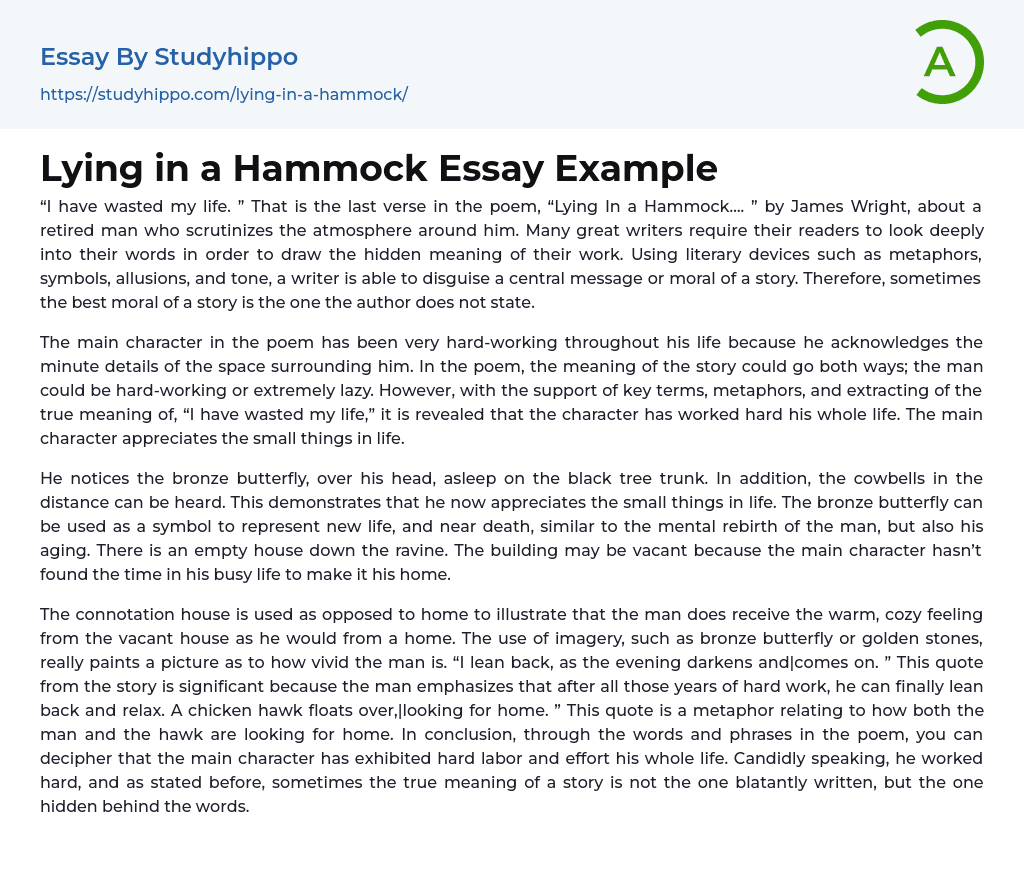“I have wasted my life. ” That is the last verse in the poem, “Lying In a Hammock…. ” by James Wright, about a retired man who scrutinizes the atmosphere around him. Many great writers require their readers to look deeply into their words in order to draw the hidden meaning of their work. Using literary devices such as metaphors, symbols, allusions, and tone, a writer is able to disguise a central message or moral of a story. Therefore, sometimes the best moral of a story is the one the author does not state.
The main character in the poem has been very hard-working throughout his life because he acknowledges the minute details of the space surrounding him. In the poem, the meaning of the story could go both ways; the man could be hard-working or extremel
...y lazy. However, with the support of key terms, metaphors, and extracting of the true meaning of, “I have wasted my life,” it is revealed that the character has worked hard his whole life. The main character appreciates the small things in life.
He notices the bronze butterfly, over his head, asleep on the black tree trunk. In addition, the cowbells in the distance can be heard. This demonstrates that he now appreciates the small things in life. The bronze butterfly can be used as a symbol to represent new life, and near death, similar to the mental rebirth of the man, but also his aging. There is an empty house down the ravine. The building may be vacant because the main character hasn’t found the time in his busy life to make it his home.
The connotation
house is used as opposed to home to illustrate that the man does receive the warm, cozy feeling from the vacant house as he would from a home. The use of imagery, such as bronze butterfly or golden stones, really paints a picture as to how vivid the man is. “I lean back, as the evening darkens and|comes on. ” This quote from the story is significant because the man emphasizes that after all those years of hard work, he can finally lean back and relax. A chicken hawk floats over,|looking for home. ” This quote is a metaphor relating to how both the man and the hawk are looking for home. In conclusion, through the words and phrases in the poem, you can decipher that the main character has exhibited hard labor and effort his whole life. Candidly speaking, he worked hard, and as stated before, sometimes the true meaning of a story is not the one blatantly written, but the one hidden behind the words.
- Boo Radley essays
- Genesis essays
- Richard iii essays
- Alice in Wonderland essays
- On the road essays
- Ozymandias essays
- The Nightingale essays
- Holden Caulfield essays
- Animal Farm essays
- 1984 essays
- A Hanging essays
- Shooting An Elephant essays
- A Tale Of Two Cities essays
- Adventures Of Huckleberry Finn essays
- Arthur Conan Doyle essays
- Brave New World essays
- Characters In Hamlet essays
- Characters In Romeo And Juliet essays
- Desdemona essays
- Diary Of A Wimpy Kid essays
- First-Person Narrative essays
- Frankenstein essays
- Heart Of Darkness essays
- Jane Eyre essays
- Jay Gatsby essays
- King Duncan essays
- Librarian essays
- Little Red Riding Hood essays
- Lord Of The Flies essays
- Silas Marner essays
- The Cask Of Amontillado essays
- The Catcher In The Rye essays
- The Crucible essays
- The Handmaid's Tale essays
- The Reader essays
- Virgil essays
- Wuthering Heights essays
- Candide essays
- Castle essays
- J. D. Salinger essays
- Ulysses essays
- Ethan Frome essays
- In Cold Blood essays
- Outliers essays
- Tuesdays With Morrie essays
- The Art of War essays
- Wife of Bath essays
- Huckleberry Finn essays
- The Lady With The Dog essays
- Great Expectations essays




